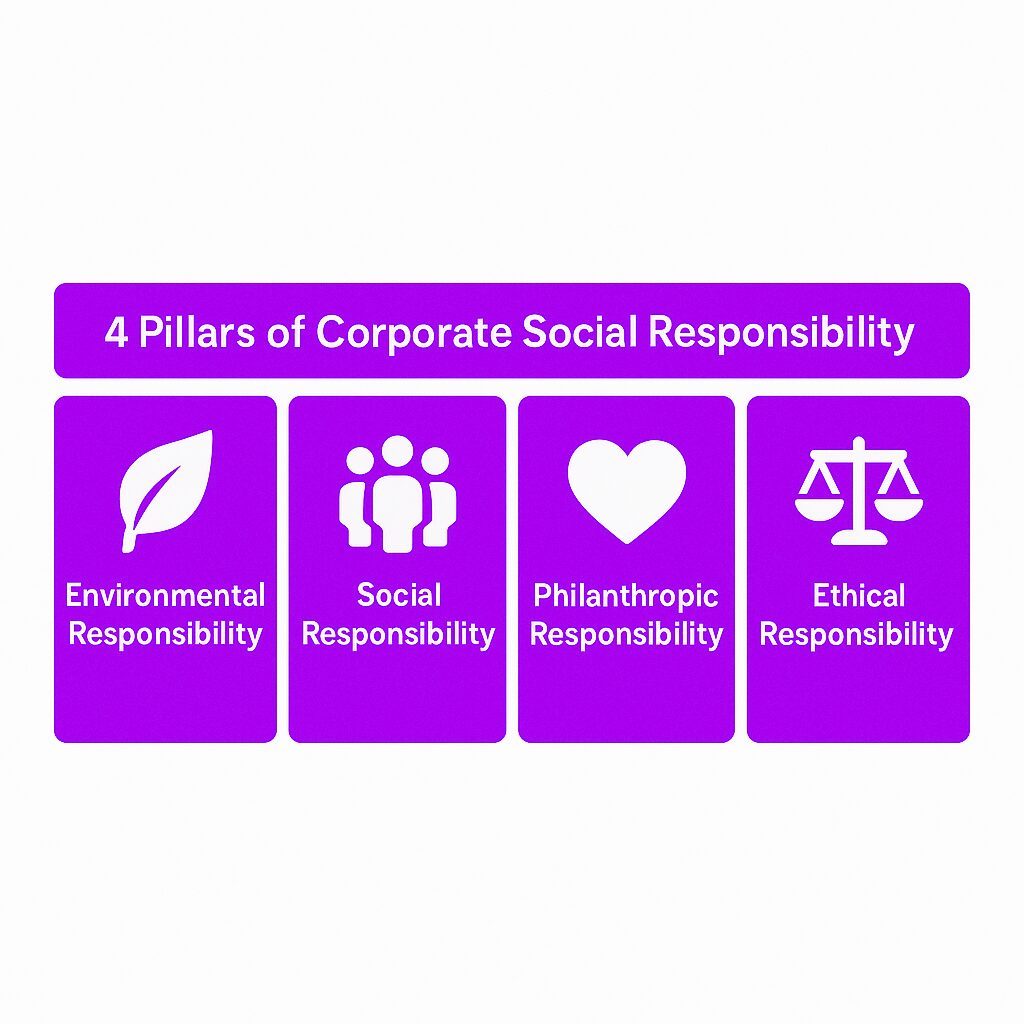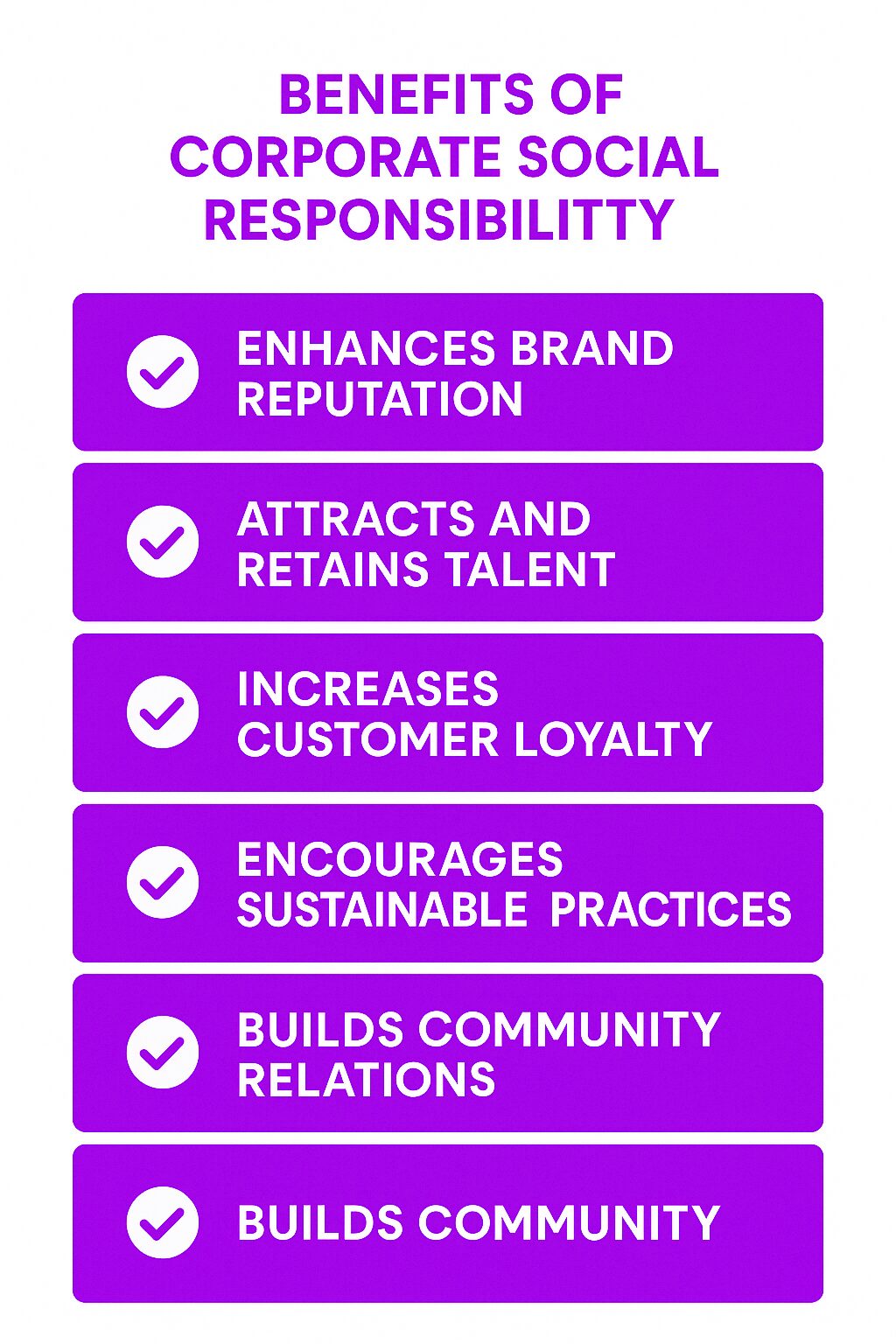What is Corporate Social Responsibility?
Corporate Social Responsibility (CSR) is a business approach where companies take responsibility for their impact on society. It extends beyond making profits to include ethical practices, sustainability efforts, and contributions to communities. Businesses that adopt a strong CSR business model actively work to improve environmental and social conditions while maintaining financial success.
CSR is not a legal obligation. It is voluntary, but customers, employees, and investors expect businesses to demonstrate responsible behavior. Companies that embrace CSR enhance their reputation, build customer loyalty, and foster long-term success.
Why CSR Matters
A business does not operate in isolation. Corporate responsibility is a vital aspect of business practices that aligns with stakeholder expectations and societal demands. Its actions affect employees, customers, communities, and the environment. Companies that neglect social responsibility face backlash, lost trust, and reputational damage. CSR ensures businesses create positive change while maintaining accountability.
CSR also benefits companies financially. Consumers prefer to buy from ethical brands. Employees are more engaged when working for companies that support meaningful causes. Investors see CSR as a sign of long-term stability. Businesses that integrate CSR into their operations gain a competitive edge.
Key Components of CSR
Environmental Responsibility
Companies impact the environment through resource consumption, emissions, and waste production. CSR practices, including environmental responsibility, involve reducing harm and promoting sustainability. Businesses achieve this by:
-
Lowering carbon emissions
-
Reducing waste and increasing recycling
-
Using sustainable materials
-
Investing in renewable energy
Example: Many tech companies have pledged to become carbon neutral by using renewable energy and offsetting emissions.
Social Responsibility
Businesses affect communities and people. Social responsibility, often demonstrated through a CSR initiative, focuses on fair treatment of employees, customers, and society. Companies practice social responsibility by:
-
Supporting workplace diversity and inclusion
-
Ensuring fair wages and labor conditions
-
Investing in employee development
-
Contributing to community programs
Example: Many global companies now require suppliers to follow ethical labor standards, preventing child labor and exploitation.
Philanthropic Responsibility
Philanthropy involves corporate social responsibility efforts such as donating money, products, or services to support social causes. It shows a company’s commitment to positive change. Businesses engage in philanthropy by:
-
Donating to charities and non-profits
-
Supporting disaster relief efforts
-
Funding education and healthcare initiatives
-
Encouraging employee volunteer programs
Example: Large corporations donate millions each year to charities that support education, poverty reduction, and medical research.
Ethical Responsibility
A company’s ethical responsibility is about doing business honestly and transparently. Ethics guide decision-making and build trust with customers, employees, and stakeholders. Companies demonstrate ethical responsibility by:
-
Avoiding misleading advertising
-
Practicing fair trade and responsible sourcing
-
Preventing corruption and bribery
-
Ensuring transparency in financial reporting
Example: A clothing brand that commits to fair trade ensures workers receive fair wages and work in safe conditions.
Benefits of CSR
Enhances Brand Reputation
Consumers support ethical businesses. Companies that engage in CSR attract loyal customers and strengthen their brand image. A good reputation also protects businesses during crises.
Attracts and Retains Talent
Employees want to work for companies that share their values. Businesses with a well-implemented CSR program see higher job satisfaction and retention rates. Engaged employees perform better and contribute to business success.
Increases Customer Loyalty
People prefer to buy from responsible companies. Customers are willing to pay more for products from brands that prioritize sustainability and ethical practices. CSR fosters long-term customer relationships.
Encourages Sustainable Business Practices
CSR promotes efficiency and innovation by integrating sustainable practices into business models. Companies that reduce waste, conserve energy, and use sustainable materials lower costs while protecting the environment.
Builds Stronger Community Relations
CSR fosters trust between businesses and communities. Companies that give back earn goodwill and support from local stakeholders.
Challenges of CSR
High Costs
CSR initiatives require investment. Switching to sustainable materials, adopting green technology, and funding social programs can be expensive. Businesses must balance CSR goals with financial realities.
Measuring Impact
Tracking the effectiveness of CSR programs is difficult. Companies struggle to quantify social and environmental impact. Clear metrics and reporting help businesses demonstrate progress.
Risk of Greenwashing
Some businesses exaggerate CSR efforts to gain public approval. False claims about sustainability damage trust. Companies must ensure their CSR commitments are genuine and backed by action.
Balancing Profit and Responsibility
Businesses exist to make profits. Some executives resist CSR, fearing it will hurt financial performance. However, CSR can drive long-term growth when integrated into business strategy.
Practical Strategies for CSR
Set Clear CSR Goals
Companies should define specific CSR objectives aligned with their values. Goals must be measurable, realistic, and relevant to business operations.
Involve Employees
CSR is most effective when employees participate. Businesses can:
-
Encourage volunteerism
-
Offer paid time off for social work
-
Provide sustainability training
Engage Stakeholders
CSR should consider the needs of employees, customers, investors, and communities. Businesses that listen to stakeholders create meaningful CSR programs.
Be Transparent
Companies must communicate their CSR efforts openly and integrate socially responsible business practices into their core operations. Regular sustainability reports and disclosures build credibility. Businesses should highlight achievements and acknowledge challenges.
Collaborate with Partners
Working with non-profits, government agencies, and industry groups strengthens CSR impact. Partnerships enable businesses to contribute more effectively to social causes.
CSR Certifications and Standards
CSR certifications and standards are essential for companies to demonstrate their commitment to social responsibility and sustainability. These certifications and standards provide a framework for companies to measure and report their CSR efforts, ensuring transparency and accountability. By adhering to recognized standards, businesses can validate their CSR initiatives and build trust with stakeholders.
B-Corp Certification
B-Corp certification is a prestigious recognition of a company’s commitment to social and environmental responsibility. To become a certified B-Corp, a company must meet rigorous standards of social and environmental performance, accountability, and transparency. The certification process involves a comprehensive assessment of a company’s CSR efforts, including its environmental impact, labor practices, and community engagement. Achieving B-Corp status signals to consumers and investors that a company is dedicated to practicing corporate social responsibility at the highest level.
ISEAL Code Compliance
ISEAL Code Compliance is a standard for sustainability certifications that ensures companies meet rigorous environmental and social standards. ISEAL is a global membership organization that promotes credible sustainability standards and certifications. Companies that comply with ISEAL codes demonstrate their commitment to sustainability and social responsibility. This compliance helps businesses align their operations with best practices in environmental stewardship and ethical responsibility, further solidifying their role as socially responsible companies.
SASB Standards
SASB (Sustainability Accounting Standards Board) standards provide a framework for companies to disclose their sustainability performance and environmental impact. SASB standards are industry-specific and provide guidance on how companies can measure and report their CSR efforts. By adopting SASB standards, companies can demonstrate their commitment to transparency and accountability. These standards help businesses communicate their CSR strategies effectively, ensuring that stakeholders are informed about their environmental impacts and social responsibility initiatives.
CSR Reporting and Transparency
CSR reporting and transparency are essential for companies to demonstrate their commitment to social responsibility and sustainability. CSR reports provide stakeholders with information on a company’s CSR efforts, including its environmental impact, labor practices, and community engagement. Transparent reporting builds trust and allows companies to showcase their achievements and address any challenges in their CSR journey.
What is a Corporate Social Responsibility Report?
A Corporate Social Responsibility (CSR) report is a document that outlines a company’s CSR efforts and performance. CSR reports provide stakeholders with information on a company’s environmental impact, labor practices, community engagement, and philanthropic efforts. CSR reports are essential for companies to demonstrate their commitment to transparency and accountability.
CSR reports typically include information on:
-
Environmental impact and sustainability efforts
-
Labor practices and human rights
-
Community engagement and philanthropy
-
Supply chain management and responsible sourcing
-
Governance and ethics
By publishing CSR reports, companies can demonstrate their commitment to social responsibility and sustainability, and provide stakeholders with valuable information on their CSR efforts. These reports serve as a testament to a company’s dedication to ethical business practices and corporate sustainability, reinforcing their role as a socially responsible company.
Real-World CSR Examples
Technology Sector
Tech giants like Apple and Google invest in renewable energy to reduce carbon footprints. Google operates on 100% renewable energy, while Apple aims to make its supply chain carbon neutral.
Retail Industry
Brands like Patagonia focus on ethical sourcing and sustainability. Patagonia repairs old clothing to extend product life and donates a portion of profits to environmental causes.
Banking and Finance
Major banks fund green energy projects and support social impact investments. They also implement ethical lending policies to ensure responsible financial practices.
Healthcare
Pharmaceutical companies provide free medications to underserved communities. Many healthcare firms also invest in disease research and global health initiatives.
Automotive
Car manufacturers like Tesla and Toyota invest in electric and hybrid vehicles to promote sustainable transportation.
Related Concepts
ESG (Environmental, Social, and Governance)
ESG measures how companies manage environmental impact, social responsibility, and corporate governance. It is often used by investors to evaluate ethical business practices.
Sustainability
Sustainability focuses on balancing economic growth, environmental protection, and social well-being. It is a core part of CSR.
Ethical Sourcing
Ethical sourcing ensures products are made under fair labor conditions, with minimal environmental harm. It prevents human rights violations in supply chains.
Diversity and Inclusion
Diversity initiatives promote equal opportunities for all employees. Inclusion ensures workplace environments are welcoming and fair.
Final Thoughts
Corporate Social Responsibility is a commitment to ethical business practices, sustainability, and community engagement. It benefits businesses, society, and the environment. While CSR requires investment, it builds trust, strengthens brand reputation, and drives long-term success. Companies that integrate CSR into their operations create a positive impact beyond profits.






